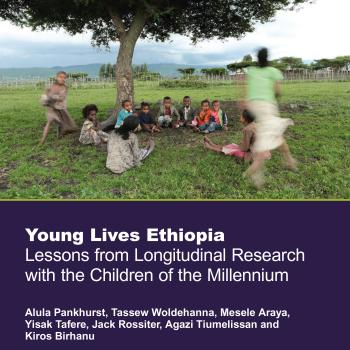Publication Information

The Young Lives Ethiopia Country Report presents results from a fifteen-year longitudinal study, which followed two cohorts of children in 20 sites selected from the five main regions of Ethiopia, from 2002 to 2016, as a component of a larger multi-country project. The research followed one cohort as they grew from infancy to adolescence (aged one to 15), and the second as they grew from early childhood to early adulthood (aged 8 to 22). The study relates conditions early in the lives of children to later outcomes, and so improves understanding of the effects of poverty on children’s life trajectories. It also provides information on the effects of policies and changes on the lives of children, and offers evidence-based guidance for policies to improve children’s chances of developing into integrated and productive members of society.
The report first outlines the Young Lives project and the context in which the Ethiopian study took place, including the engagement between researchers and the Ethiopian government’s efforts to improve the lives of its children. It presents key findings and policy implications on four main areas of study: poverty dynamics; child health and nutrition; education and learning; and wellbeing and child protection. The report concludes with implications of the findings for future policy,and the benefits of continuing the research.
A summary of this report is available here. For related materials, follow us on Twitter @yloxford.

The Young Lives Ethiopia Country Report presents results from a fifteen-year longitudinal study, which followed two cohorts of children in 20 sites selected from the five main regions of Ethiopia, from 2002 to 2016, as a component of a larger multi-country project. The research followed one cohort as they grew from infancy to adolescence (aged one to 15), and the second as they grew from early childhood to early adulthood (aged 8 to 22). The study relates conditions early in the lives of children to later outcomes, and so improves understanding of the effects of poverty on children’s life trajectories. It also provides information on the effects of policies and changes on the lives of children, and offers evidence-based guidance for policies to improve children’s chances of developing into integrated and productive members of society.
The report first outlines the Young Lives project and the context in which the Ethiopian study took place, including the engagement between researchers and the Ethiopian government’s efforts to improve the lives of its children. It presents key findings and policy implications on four main areas of study: poverty dynamics; child health and nutrition; education and learning; and wellbeing and child protection. The report concludes with implications of the findings for future policy,and the benefits of continuing the research.
A summary of this report is available here. For related materials, follow us on Twitter @yloxford.

